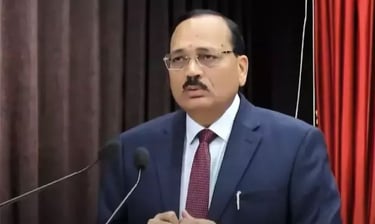Justice Surya Kant Honors Gandhi and Shastri on Birth Anniversary
On October 2, Justice Surya Kant paid heartfelt tribute to Mahatma Gandhi and Lal Bahadur Shastri, recalling their values of truth, simplicity, and integrity. His address underscored the importance of reviving these ideals in today’s India, where their principles remain vital for justice, governance, and public life.


By: Bharat Daily Samachar Date: 2 October,2025
Remembering Two Great Sons of India
October 2 is a day of double significance in India’s history. It marks the birth anniversary of Mahatma Gandhi, the Father of the Nation, and Lal Bahadur Shastri, India’s second Prime Minister. This year, the day was observed with reverence across the country, with leaders, citizens, and institutions paying homage to their timeless legacies. Among them, Justice Surya Kant delivered a moving tribute, reflecting on how the ideals of Gandhi and Shastri continue to guide India’s moral and democratic journey.
Justice Surya Kant’s Tribute
Speaking at a commemorative event, Justice Surya Kant highlighted that Gandhi’s philosophy of truth, non-violence, and justice for all remains the cornerstone of India’s constitutional and judicial framework. He observed that Gandhi was not just a freedom fighter but also a thinker who envisioned a nation based on equality, compassion, and dignity for every individual.
Justice Kant also remembered Lal Bahadur Shastri, describing him as the embodiment of humility and integrity. Shastri’s slogan, “Jai Jawan, Jai Kisan,” still resonates in the nation’s collective memory, symbolizing respect for both the defenders of the land and the farmers who feed the country.
Gandhi’s Eternal Principles in Today’s Context
In his address, Justice Surya Kant stressed that Gandhi’s philosophy is not confined to the past; it is a living guide for modern India. From climate change to communal harmony, Gandhi’s principles offer solutions that are more relevant today than ever.
Truth and Transparency: In a time of rising misinformation and distrust, Gandhi’s commitment to truth provides the ethical foundation for public life.
Non-Violence: In a world plagued by conflict and polarization, Gandhi’s path of non-violence reminds us of the power of dialogue and peaceful resolution.
Simplicity and Sustainability: Gandhi’s lifestyle stands as an early call for sustainable living, urging us to minimize consumption and respect the environment.
Justice Kant emphasized that these lessons must be internalized, not just celebrated once a year.
Shastri’s Lessons in Leadership
Turning to Shastri’s contributions, Justice Surya Kant reflected on his quiet yet powerful leadership style. Shastri took charge of the nation in 1964 during turbulent times, following the sudden demise of Jawaharlal Nehru. Despite the challenges, Shastri steered the country with composure and conviction.
His leadership during the 1965 war with Pakistan, where he balanced firmness with diplomacy, showed his ability to take tough decisions without compromising on peace. His call of “Jai Jawan, Jai Kisan” continues to remind India of the importance of national security and agricultural strength.
Justice Kant noted that in an era where leadership often gets equated with grandeur and visibility, Shastri’s life proves that humility and sincerity are equally powerful.
A Message for Today’s India
Justice Surya Kant’s tribute was not merely ceremonial; it carried a message for present and future generations. He urged citizens, especially the youth, to draw inspiration from these leaders.
He pointed out that while India has advanced in technology, economy, and global stature, it must also focus on ethical governance, fairness in justice, and social harmony—values that Gandhi and Shastri embodied.
Justice Kant observed, “The best way to honor Gandhi and Shastri is not by garlanding their portraits, but by living the values they stood for—truth, simplicity, integrity, and service to the nation.”
Public Reactions and Nationwide Observance
Across India, October 2 was marked with prayers, community service drives, cleanliness campaigns, and cultural programs. In schools and universities, students performed plays and debates on Gandhi and Shastri’s contributions. Politicians across the spectrum paid floral tributes at Raj Ghat and Vijay Ghat, the memorials of Gandhi and Shastri respectively.
In rural India, farmers remembered Shastri’s emphasis on self-reliance in agriculture, while NGOs and civil society organizations invoked Gandhi’s call for grassroots development. Social media was flooded with messages, artwork, and reflections, showing that even in the digital age, the legacy of these two leaders remains deeply embedded in the national consciousness.
A Legacy That Lives On
As Justice Surya Kant concluded his tribute, he reminded listeners that Gandhi and Shastri were not just historical figures but symbols of values that India needs today. Gandhi’s moral courage and Shastri’s honest leadership are lessons for a generation grappling with challenges of corruption, environmental crises, and political divisiveness.
The birth anniversaries of Gandhi and Shastri serve as an annual reminder that nations are not built on power alone, but on character and conscience. Justice Kant’s reflections struck a chord, bringing forth the realization that if India is to truly rise as a global leader, it must walk the path shown by these two men of simplicity and strength.
